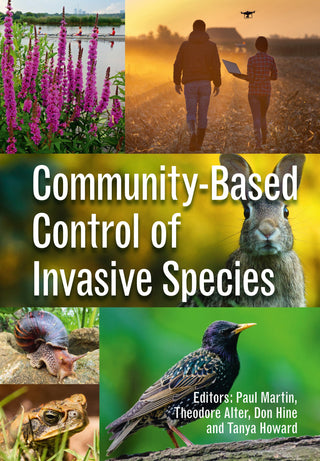Community-Based Control of Invasive Species
- Unit price
- / per
-
Author:Paul Martin / Theodore Alter / Don Hine
-
ISBN:9781486308873
-
Publication Date:June 2019
-
Edition:1
-
Pages:288
-
Binding:Hardback
-
Publisher:CSIRO Publishing
-
Country of Publication:Australia


A Back Order button means that we don’t have the book in stock at our store. It may already be on order – or we can order it for you from a publisher or distributor at no additional cost.
As we source items from around the globe, a back-order can take anywhere from 5 days to several weeks to arrive, depending on the title.
To check how long this might take, you’re welcome to contact us and we can provide an ETA or any other information you need. We recommend checking the timeframe before committing to an online order.
Community-Based Control of Invasive Species
- Unit price
- / per
-
Author:Paul Martin / Theodore Alter / Don Hine
-
ISBN:9781486308873
-
Publication Date:June 2019
-
Edition:1
-
Pages:288
-
Binding:Hardback
-
Publisher:CSIRO Publishing
-
Country of Publication:Australia
Description
Explains institutional frameworks and different approaches to voluntary citizen stewardship.
Invasive species are among the greatest challenges to environmental sustainability and agricultural productivity in the world. One of the most promising approaches to managing invasive species is voluntary citizen stewardship. However, in order for control measures to be effective, private citizens often need to make sustained and sometimes burdensome commitments.
Community-Based Control of Invasive Species is based on five years of research by leading scholars in natural resource and human behavioural sciences, which involved government and citizen groups in Australia and the United States. It examines questions including, 'how can citizens be engaged in voluntarily managing invasive species?', 'what communication strategies will ensure good motivation and coordination?' and 'how can governing bodies support citizens in their efforts?'.
With chapters on institutional frameworks, changing governance, systems thinking, organisational learning, engagement, communication and behavioural change, this book will be a valuable reference for researchers and practitioners involved in natural resources management.
Adding product to your cart
You may also like
A Back Order button means that we don’t have the book in stock at our store. It may already be on order – or we can order it for you from a publisher or distributor at no additional cost.
As we source items from around the globe, a back-order can take anywhere from 5 days to several weeks to arrive, depending on the title.
To check how long this might take, you’re welcome to contact us and we can provide an ETA or any other information you need. We recommend checking the timeframe before committing to an online order.
You may also like
You may also like
-
Explains institutional frameworks and different approaches to voluntary citizen stewardship.
Invasive species are among the greatest challenges to environmental sustainability and agricultural productivity in the world. One of the most promising approaches to managing invasive species is voluntary citizen stewardship. However, in order for control measures to be effective, private citizens often need to make sustained and sometimes burdensome commitments.
Community-Based Control of Invasive Species is based on five years of research by leading scholars in natural resource and human behavioural sciences, which involved government and citizen groups in Australia and the United States. It examines questions including, 'how can citizens be engaged in voluntarily managing invasive species?', 'what communication strategies will ensure good motivation and coordination?' and 'how can governing bodies support citizens in their efforts?'.
With chapters on institutional frameworks, changing governance, systems thinking, organisational learning, engagement, communication and behavioural change, this book will be a valuable reference for researchers and practitioners involved in natural resources management.
-
-
Author: Paul Martin / Theodore Alter / Don HineISBN: 9781486308873Publication Date: June 2019Edition: 1Pages: 288Binding: HardbackPublisher: CSIRO PublishingCountry of Publication: Australia
Explains institutional frameworks and different approaches to voluntary citizen stewardship.
Invasive species are among the greatest challenges to environmental sustainability and agricultural productivity in the world. One of the most promising approaches to managing invasive species is voluntary citizen stewardship. However, in order for control measures to be effective, private citizens often need to make sustained and sometimes burdensome commitments.
Community-Based Control of Invasive Species is based on five years of research by leading scholars in natural resource and human behavioural sciences, which involved government and citizen groups in Australia and the United States. It examines questions including, 'how can citizens be engaged in voluntarily managing invasive species?', 'what communication strategies will ensure good motivation and coordination?' and 'how can governing bodies support citizens in their efforts?'.
With chapters on institutional frameworks, changing governance, systems thinking, organisational learning, engagement, communication and behavioural change, this book will be a valuable reference for researchers and practitioners involved in natural resources management.
-
Author: Paul Martin / Theodore Alter / Don HineISBN: 9781486308873Publication Date: June 2019Edition: 1Pages: 288Binding: HardbackPublisher: CSIRO PublishingCountry of Publication: Australia
-



